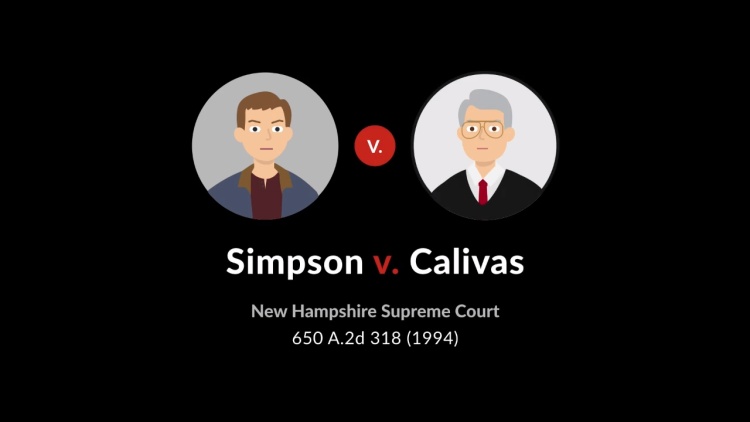Simpson v. Calivas
Supreme Court of New Hampshire
650 A.2d 318 (1994)

- Written by Christine Raino, JD
Facts
Christopher Calivas (defendant) drafted a will for Robert H. Simpson, Sr. that distributed all of Simpson Sr.’s real property to his son, Robert H. Simpson, Jr. (plaintiff), except the Piscataqua Road “homestead,” which was devised to Robert Sr.’s second wife as a life estate, and the remainder to Robert, Jr. Robert Sr.’s land on Piscataqua Road included land and buildings related to the family’s business as well as the family house. According to notes taken by Calivas during an estate planning meeting with Simpson Sr., Simpson, Sr. specified that only the house should go to his second wife as a life estate and all remaining real property should go to Simpson, Jr. However, the probate court, in construing the will, did not consider Calivas’ notes and determined that “homestead” referred to all of the property on Piscataqua Road and not just the house. Simpson, Jr. then commenced an action against Calivas for malpractice, alleging negligence and breach of contract as a third party beneficiary. The trial court granted summary judgment on collateral estoppel grounds, holding that the probate court had already considered evidence of Simpson Sr.’s intent to give all of the “homestead” property to his wife as a life estate. The trial court also directed a verdict for Calivas, holding that no duty runs from an attorney who drafts a will to the intended beneficiaries with whom there is no privity. Simpson Jr. appeals to the Supreme Court of New Hampshire.
Rule of Law
Issue
Holding and Reasoning (Horton, J.)
What to do next…
Here's why 911,000 law students have relied on our case briefs:
- Written by law professors and practitioners, not other law students. 47,100 briefs, keyed to 997 casebooks. Top-notch customer support.
- The right amount of information, includes the facts, issues, rule of law, holding and reasoning, and any concurrences and dissents.
- Access in your classes, works on your mobile and tablet. Massive library of related video lessons and high quality multiple-choice questions.
- Easy to use, uniform format for every case brief. Written in plain English, not in legalese. Our briefs summarize and simplify; they don’t just repeat the court’s language.





